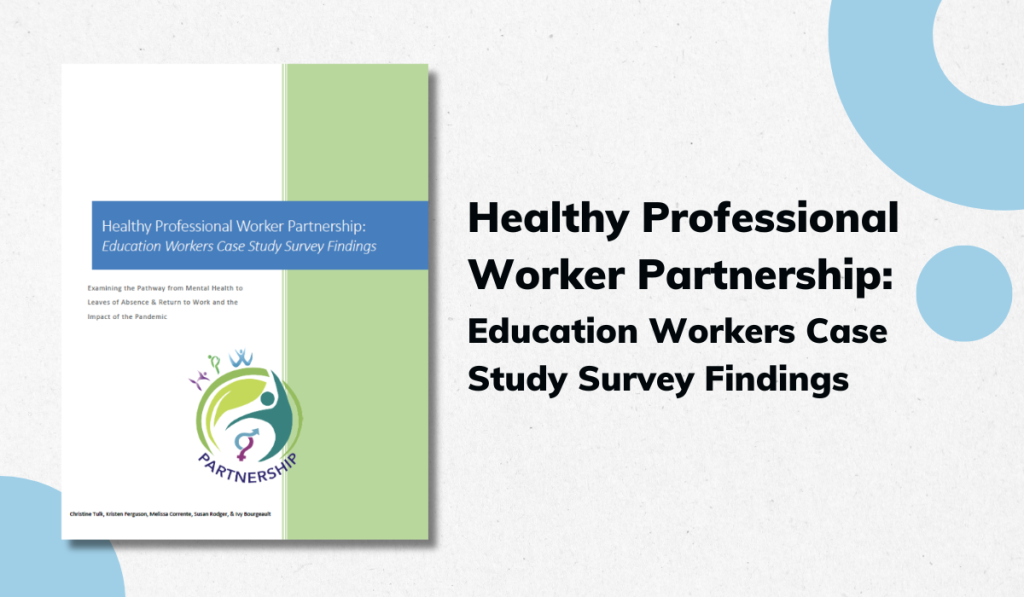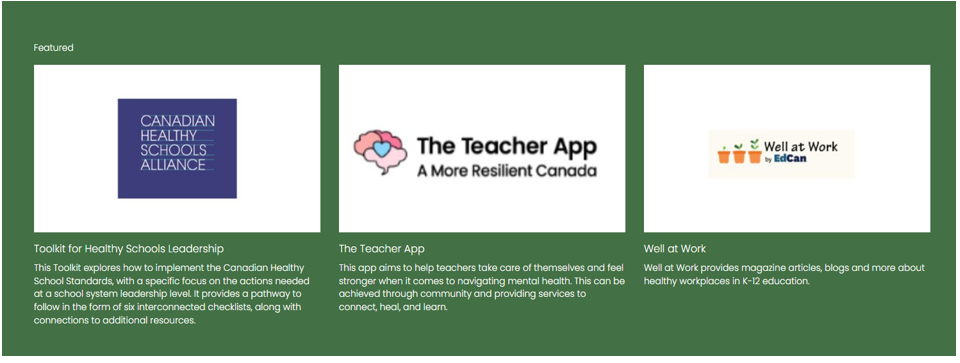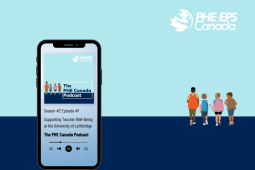Mental Health Toolkit for Education Workers: A Resource

Did you know that "the majority of education workers (59%) have experienced mental health issues, with women and secondary school education workers being more severely impacted"?
With Mental Health Week in Canada and Education Week in Ontario starting May 6th, 2024, we spoke with Dr. Melissa Corrente who was a part of conducting the Healthy Professional Worker (HPW) Partnership education workers case study to learn more about their report and how this led to the creation of the “Education Worker Toolkit”.
The Healthy Professional Worker (HPW) Partnership, a research project funded by the Canadian Institute for Health Research (CIHR) and the Social Sciences & Humanities Research Council (SSHRC), recently released a report which examined the connections between teachers mental health, leaves of absences and return to work processes, and the impact of the pandemic on education workers across Canada. The HPW partnership involves over 25 investigators and 17 trainees, at 16 universities, the principal investigator is Dr. Ivy Bourgeault from the University of Ottawa.
While navigating the unique complexities and responsibilities that come with the teaching profession, educators are continuously striving to provide their students with the best possible learning experiences. Now more than ever, it is important to recognize, understand, and address the challenges and realities of the profession to create supportive environments that allow teachers to thrive. By empowering teachers to nurture and prioritize their mental health and well-being they can lead a healthier and more resilient teaching community.
Q: Can you tell us a bit about yourself and your research?
I am a senior research associate at the University of Ottawa and a part-time instructor in the Schulich School of Education at Nipissing University in North Bay. I am a passionate educator who has always been drawn to physical activity and the outdoors. Some of my favorite activities include snowshoeing, swimming, bike riding and doing yoga. My two children keep me curious and inspire me to keep reading and learning. When I’m not teaching or conducting research you can find me in the kitchen cooking or spending time with family and friends.
The Healthy Professional Worker (HPW) Partnership is a research project that examines the mental health, leaves of absence and return to work experiences of different professional workers from a comparative and intersectional gender lens. Our team focused on the mental health experiences of education workers, their decision to take a leave of absence from work and how they return to work. Education workers from across Canada completed an online survey and participated in interviews to share their experiences with mental health and how the pandemic impacted their job.
Q: Was there anything in particular that motivated you to conduct this type of research?
I was drawn to research teacher mental health based on my personal experiences as a new teacher. The only support I was aware of when I started was the Employee Assistance Program (EAP). There is not a lot of support available when you’re struggling with mental health issues and if I hadn’t found a mentor teacher, I would have left the profession. My colleague at Nipissing University, Dr. Kristen Ferguson is the HPW team lead for the education profession and she gratefully introduced me to the project.
Q: What were some of the main findings from “Education Workers Case Study Survey Findings”?
We found that the majority of education workers (59%) have experienced mental health issues, with women and secondary school education workers more severely impacted. To cope with mental health challenges, the majority of education workers made changes to their work (61%), including retreating, and using sick and vacation days. The majority of education workers who experienced mental health issues considered taking a leave of absence from work (68%) and 39% of education workers with a mental health issue took a formal leave of absence.

Education workers reported making changes to their work or training in response to a mental health issue. The most common response across all education workers was to retreat from work by taking sick days or vacation time followed by seeking social support at work and utilizing workplace mental health promotion programs.
Commonly cited reasons for not taking a leave of absence included believing their mental health issue was not severe enough, the impact the leave would have on students, and financial reasons. The majority of education workers returned to the job they had prior to taking a leave of absence for mental health concerns (79%). Increases in burnout were higher among secondary school education workers, and teachers reported greater increases in burnout during the pandemic compared to EAs and ECEs. The full report can be found here.
Q: Can you tell us about the Education Worker Toolkit?
The Education Worker Toolkit is a bilingual virtual hub of high-quality resources to help improve education worker mental health. It focuses on resources at the system, organization and team level. There is a filtering option where education workers can search by user, format, location, cost and language. For example, if you’re currently in a teacher education program you can filter resources by choosing ‘trainee’ and only resources relevant for your situation will appear. Check out this video to learn more about how the Toolkit works.
Q: Based on the research, where do you see the future of teacher well-being?
The future of teacher well-being needs to focus on stronger policies that support mental health. Governments need to pay support staff such as educational assistants and early childhood educators a living wage. If we want to recruit and retain education workers their working conditions need to improve. This includes lowering class sizes and increasing the amount of support provided to students and staff. Leadership and administration within the school system also need support and mental health training to deal with the increased mental health demands across the educational landscape.
We hope that our research and mental health toolkit will bring awareness to the fact that teacher well-being is not solely an individual responsibility. Teachers need to be well during the school day and this involves system and organizational changes. No amount of self-care will help a teacher who is working in an environment that doesn’t promote psychological health and safety. Education workers need supportive and collaborative leadership and a culture that promotes well-being and appropriate boundary setting between work and home life. Creating this community starts with meaningful dialogue and actively listening to the concerns of education workers.
Although our research project is near completion, we hope to continue updating the toolkit and adding new resources as they become available. We will actively seek out opportunities to share our findings and resources with educational leaders who can positively influence teacher mental health.

Q: What recommendations or tips would you give teachers and schools to implement right now when it comes to supporting education worker well-being?
I recommend every school create a wellness working committee of champions (i.e., teachers, education workers, administrators, parents/guardians, community members, school board officials) who want to improve education worker mental health. Start small and identify one goal that can be achieved during the school year (e.g. reducing email use, limiting after hours and weekend messaging, advocating for mental health days, teacher driven professional development or team teaching).
I encourage educators to connect with one another and check on each other regularly. Focus on what you can control and report unsafe working conditions. Create work-home life boundaries that respect your unique situation and utilize benefits provided to you by your employee assistance program.
Acknowledgements - Financial support for this research was provided by a Partnership Grant from the Canadian Institutes of Health Research and the Social Sciences and Humanities Research Council of Canada as part of their Healthy Productive Worker initiative. We would like to thank our partner organizations, the Canadian Teachers’ Federation (CTF/FCE) and the Ontario Secondary School Teachers’ Federation (OSSTF) for their assistance with the survey design and recruitment, as well as all of the Canadian education workers who participated in our study.








